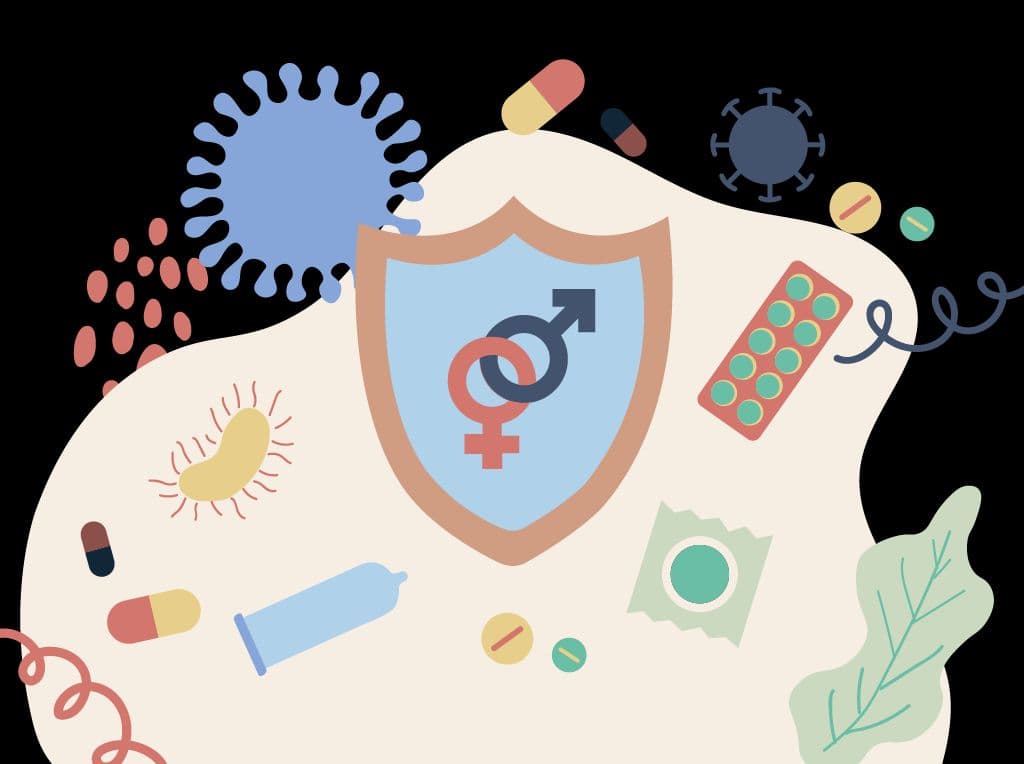What are STIs?
Sexually transmitted infections are ones that are developed as a result of unprotected intimate sexual contact between two persons. In some cases, STI’s can also occur as a result of sharing intimate objects such as sex toys, intimate clothing and towels. As opposed to what people generally think, penetrative sexual intercourse isn’t the only way one can develop an STI.
Which are the common STIs?
The most common sexually transmitted infections are Chlamydia, Gonorrhea, Syphilis, HIV and Hepatitis B. These conditions may cause any of the symptoms mentioned below or in some cases, may not cause any symptoms at all. Other than the immediate discomfort they cause, these STIs can have long term adverse effects on health. Contrary to popular misconception, vaginal yeast infection is not considered an STI.
The ones that are less common include Human Papillomavirus (HPV), trichomoniasis, Herpes, Scabies and Pubic Lice. The most important one is HPV. It is the leading cause of cervical cancer worldwide. Early diagnosis and treatment have shown to reduce the mortality rate of cervical cancer. Other than cervical cancer, it is associated with vaginal cancer, vulvar warts, anal warts and condylomata accuminata (genital warts). Scabies and Lice are amongst the rare infections that can cause irritating and uneasy symptoms to the patients.
Symptoms:
These are the commonly found symptoms :
- Vaginal Irritation : One may experience symptoms such as vaginal itching, burning, pain, redness and swelling.
- Genital lesions: These can vary from painful or painless ulcers, single or multiple in number depending on the type of STI. In some cases, a widespread rash may also be seen.
- Urinary Symptoms : These are especially common in conditions like Chlamydia and Gonorrhoea. One may experience burning and pain while passing urine that might often be misdiagnosed as a UTI. A urine test will clear that doubt.
- Change in vaginal discharge : Any change in the color, odor or quantity of discharge is a good reason to get tested for STIs. Bleeding between periods or intermenstrual spotting as it is called is also suggestive of STI’s.
- Systemic Symptoms : Based on immune status and overall health, one may also experience symptoms such as fever, weight loss, nausea and belly pain. These symptoms are more common in persons infected with Hepatitis B or the more immunocompromised persons infected with HIV.
What happens if we leave it untreated?
STIs should not be left untreated. They can hamper your fertility and confidence among many things.
- They can lead to Pelvic Inflammatory Disease a.k.a PID, which, if not treated, affects the female genital tract in many ways. It most commonly affects fertility rates. Infertility is a major complication caused by these STIs as they make the uterus unfavourable for pregnancy.
- They cause adhesions that distort the genital tract that can cause the pregnancy to occur outside the normal uterine cavity(ectopic pregnancy) which if goes unnoticed can be fatal.
- They can also interfere with the normal menstruation and do not allow normal blood flow which can back up and cause a lot of problems, mostly infection.
- Untreated infection can be a cause of chronic pelvic pain.
- If a pregnant woman is unaware of her STI, it can affect the fetus and even result in fetal demise or other complications.

The taboo with sexual health
Sexual health is an important part of our general health yet is something that is often neglected, perhaps out of embarrassment or apprehension about the process of diagnosis and treatment. This prevents a lot of women from getting tests for STIs. These infections are treatable.
The process of testing has evolved over time and in many cases can be done via a urine sample or blood test. In some cases, your doctor or sexual health practitioner might need to perform an examination. In addition to services offered by doctors, sexual health clinics can be found across the country and can help with any concerns about sexual health.
Test and Treatment
The good news is that treatment is often straightforward. Chlamydia and Gonorrhea can be treated with antibiotics. Genital warts and herpes symptoms can be managed, but both are life-long conditions as the viruses that cause them cannot be cleared from the patient’s system and can flare up over time, needing further treatment. Whilst there is no cure for HIV, there are now treatments that enable people to lead longer and healthier lives.
Other than the above- mentioned reasons, women should get tested because it's extremely easy to get tested for STIs. At home testing kits are also a great option. They’re extremely simple and affordable, also respecting an individual’s privacy. Most STIs are treatable, with almost no complications, if diagnosed early.
Take control of your Sexual Health
It’s not easy to let a previous or current partner know about a positive test result, but it is vital. Even if you are in a monogamous relationship, being in control of yours and your partner’s health is imperative. It goes both ways, so you should ask your partner to get tested and treated for infections that they might have, but have no clue about.
With the complications of STIs being far-reaching, early treatment is imperative. Practising safe sex and taking an active role in protecting your sexual health is essential to prevent the long term complications of STIs, not only for you but also for your sexual partners. Don’t be put off seeking screening and testing through embarrassment. There’s too much at stake.
Read Also: All Your Questions on STIs Answered!
This article is meant to create an awareness of STIs in women. If you had sexual contact and is unsure about contracting STI, please screen yourself against the common infections to prevent it from flaring up. As they say, prevention is better than cure.
Disclaimer: This information is educational and should not be construed as medical advice. Please consult your doctor before making any dietary changes or adding supplements.
Proactive For Her is a digital clinic for women, offering accessible, personalised, and confidential healthcare solutions. We offer out-patient care, diagnostic services and programs for various health concerns of Indian women, across their lifetime - from puberty to pregnancy to menopause.

